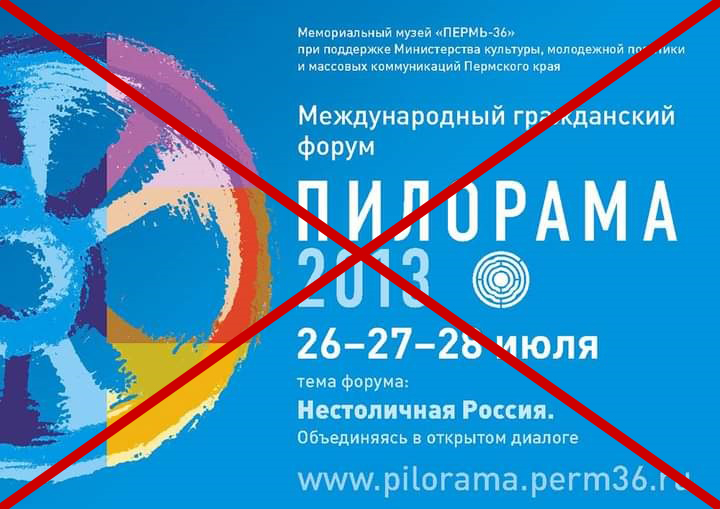From July 26 to 28, 2013, the International Civil Forum «Pilorama» was supposed to take place at the Perm-36 Museum, organized by the museum team since 2005. However, with its formal postponement to autumn and, in fact, its cancellation, the long and painful period of forced «nationalization» of the public museum «Perm-36» began.
Both posters and announcements for the forum had already been published, traditionally featuring a rich program of music, theater, and cinema. Bards, including Alexander Gorodnitsky and Veronika Dolina, rock bands like «Centr» and «Electric Partisans» a documentary performance by the Sakharov Center titled «Second Act. Grandchildren» based on interviews with grandchildren and great-grandchildren of NKVD leaders, and the premiere screening of Alexander Mitta’s new film dedicated to the early years of the Gulag formation—these were just a few of the «stellar» announcements made to the future «Pilorama» guests. And, of course, the central events were the discussion platforms with speakers like the Russian Human Rights Commissioner Vladimir Lukin, Chairman of the Human Rights Council under the President of the Russian Federation Mikhail Fedotov, economists Irina Starodubrovskaya, Sergei Aleksashenko, Yevgeny Sapir, and Irina Yasina, writer Ludmila Ulitskaya, journalists Zoya Svetova and Maxim Shevchenko, and political scientist Gleb Pavlovsky.
Then, like a thunderbolt from a clear sky, the fate of the forum was in question. Externally, the reasons for canceling the event, announced three weeks before its start, were attributed to financial issues. On July 8, acting Minister of Culture Igor Gladnev took responsibility for cutting the festival-forum’s budget in half: from 5 to 2.5 million rubles. He explained this with questions of financial priorities for the ministry. However, in an interview with Radio Svoboda in 2016, the founder of the museum, Victor Shmirov, directly pointed out that the real reasons for the cancellation were of a political nature:
«Why did ‘Pilorama’ disappear? In 2013, they gave us strict conditions. They demanded that we remove certain people. The administration of the governor named four names from the discussion platform. Our fellow countryman Yevgeny Saulovich Sapir – one, Gleb Pavlovsky – two. The third – Yevgeny Roizman (a few months later, he became the mayor of Yekaterinburg. – Ed.). The fourth – Mikhail Egonovich Dmitriev, an economist-sociologist who accurately predicted the December 2011 events in Moscow a year and a half before they happened. We refused to remove them, and ‘Pilorama’ ceased to exist. If we removed them, it might have continued in a reduced form. It’s easy to take the first step. We refused».
However, the organizers didn’t lose hope: the festival events were moved to autumn and, of course, significantly reduced. There were even plans for the tenth – jubilee – «Pilorama» in 2014. But the country was rapidly changing before our eyes, and that «Perm anomaly», where everyone could breathe freely even in the crisis year of 2012, was no longer destined to revive.


